BYD ETP3 VS Mercedes GLB – Specs, Efficiency & Price Comparison
Which model is the better choice – the BYD ETP3 or the Mercedes GLB? We compare performance (136 HP vs 320 HP), boot capacity ( vs 570 L), efficiency ( vs 5.60 L), and of course, the price (31600 £ vs 40500 £).
Find out now which car fits your needs better!
The BYD ETP3 (Cargo Van) is powered by a Electric engine and comes with a Automatic transmission. In comparison, the Mercedes GLB (SUV) features a Petrol MHEV or Diesel engine and a Automatic gearbox.
When it comes to boot capacity, the BYD ETP3 offers , while the Mercedes GLB provides 570 L – depending on what matters most to you. If you’re looking for more power, you’ll need to decide whether the 136 HP of the BYD ETP3 or the 320 HP of the Mercedes GLB suits your needs better.
There are also differences in efficiency: vs 5.60 L. In terms of price, the BYD ETP3 starts at 31600 £, while the Mercedes GLB is available from 40500 £.
Compare all the key specs now and find out which model fits your lifestyle best!
BYD ETP3
The BYD ETP3 is a versatile electric van that seamlessly blends functionality with environmental consciousness. Its modern design is complemented by a spacious interior, making it ideal for both urban deliveries and day-to-day personal use. Advanced technology features ensure a smooth and efficient driving experience, setting a new standard in the electric vehicle market.
details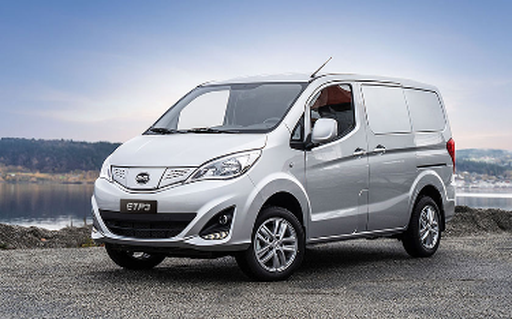 @ press.bydauto.be
@ press.bydauto.be
Mercedes GLB
The Mercedes-Benz GLB exudes a robust yet sophisticated presence, combining the versatility of an SUV with the elegance the brand is renowned for. Its spacious interior is thoughtfully designed to accommodate modern lifestyles, offering flexibility and comfort for both drivers and passengers. With advanced technology seamlessly integrated throughout, the GLB ensures a driving experience that is both dynamic and intuitive.
details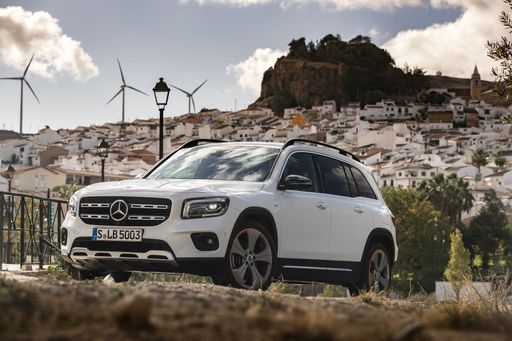 @ group-media.mercedes-benz.com
@ group-media.mercedes-benz.com
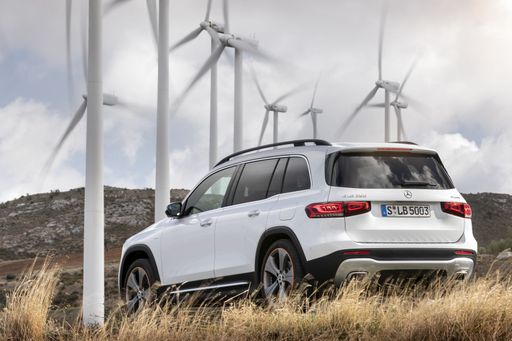 @ group-media.mercedes-benz.com
@ group-media.mercedes-benz.com
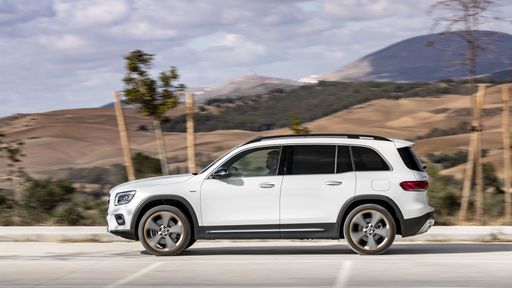 @ group-media.mercedes-benz.com
@ group-media.mercedes-benz.com
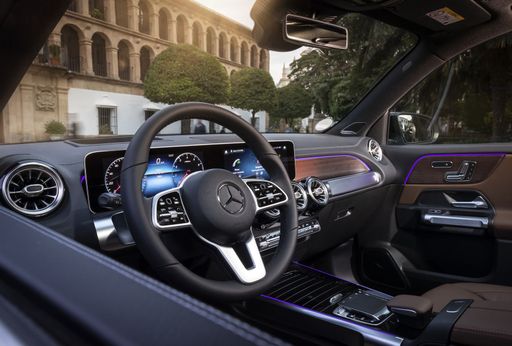 @ group-media.mercedes-benz.com
@ group-media.mercedes-benz.com
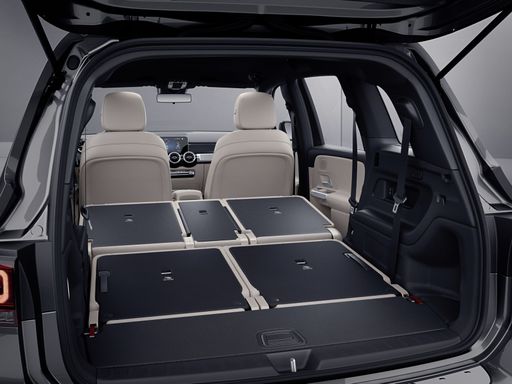 @ group-media.mercedes-benz.com
@ group-media.mercedes-benz.com

|

|
|
|
|
Costs and Consumption |
|
|---|---|
|
Price
31600 £
|
Price
40500 - 65300 £
|
|
Consumption L/100km
-
|
Consumption L/100km
5.6 - 9 L
|
|
Consumption kWh/100km
-
|
Consumption kWh/100km
-
|
|
Electric Range
233 km
|
Electric Range
-
|
|
Battery Capacity
-
|
Battery Capacity
-
|
|
co2
0 g/km
|
co2
146 - 204 g/km
|
|
Fuel tank capacity
-
|
Fuel tank capacity
52 - 60 L
|
Dimensions and Body |
|
|---|---|
|
Body Type
Cargo Van
|
Body Type
SUV
|
|
Seats
2
|
Seats
5
|
|
Doors
5
|
Doors
5
|
|
Curb weight
1640 kg
|
Curb weight
1640 - 1820 kg
|
|
Trunk capacity
-
|
Trunk capacity
565 - 570 L
|
|
Length
4460 mm
|
Length
4634 - 4650 mm
|
|
Width
1720 mm
|
Width
1834 - 1850 mm
|
|
Height
1875 mm
|
Height
1665 - 1692 mm
|
|
Payload
780 kg
|
Payload
500 kg
|
Engine and Performance |
|
|---|---|
|
Engine Type
Electric
|
Engine Type
Petrol MHEV, Diesel
|
|
Transmission
Automatic
|
Transmission
Automatic
|
|
Transmission Detail
-
|
Transmission Detail
Automat. Schaltgetriebe (Doppelkupplung)
|
|
Drive Type
Rear-Wheel Drive
|
Drive Type
Front-Wheel Drive, All-Wheel Drive
|
|
Power HP
136 HP
|
Power HP
116 - 320 HP
|
|
Acceleration 0-100km/h
-
|
Acceleration 0-100km/h
5.5 - 11.5 s
|
|
Max Speed
100 km/h
|
Max Speed
188 - 250 km/h
|
|
Torque
180 Nm
|
Torque
230 - 400 Nm
|
|
Number of Cylinders
-
|
Number of Cylinders
4
|
|
Power kW
100 kW
|
Power kW
85 - 235 kW
|
|
Engine capacity
-
|
Engine capacity
1332 - 1991 cm3
|
General |
|
|---|---|
|
Model Year
2023
|
Model Year
2025
|
|
CO2 Efficiency Class
A
|
CO2 Efficiency Class
E, F, G
|
|
Brand
BYD
|
Brand
Mercedes-Benz
|
BYD ETP3
A Revolution in Electric Transport: The BYD ETP3
The BYD ETP3, a breakthrough in the realm of electric light-commercial vehicles, epitomises innovation and efficiency. As a trailblazer from the Chinese automotive giant BYD, the ETP3 is designed to redefine the electric vehicle (EV) market, blending practicality with cutting-edge technology. This article delves into the technical details and groundbreaking innovations that make the BYD ETP3 an intriguing contender in the field of green transportation.
Powertrain and Performance: Setting New Standards
At the heart of the BYD ETP3 lies an electric motor delivering an impressive 136 PS (100 kW), with a rear-wheel drive configuration that ensures a robust performance. This setup promises a seamless driving experience augmented by a torque of 180 Nm, rendering the ETP3 adept at handling the rigorous demands of logistics and commercial tasks.
The vehicle's 233 km electric range reaffirms its position as a practical and efficient choice for city-based transport, reducing the need for frequent charging stops and enhancing productivity. The maximum speed of 100 km/h ensures the ETP3 remains steady and safe on urban roadways.
Innovative Design and Practicality
The BYD ETP3, while primarily focused on functionality, does not compromise on aesthetics. The sleek exterior, extending to 4,460 mm in length, 1,720 mm in width, and 1,875 mm in height, is thoughtfully designed to maximise both aerodynamic efficiency and load space. With a generous payload capacity of 780 kg, the ETP3 is poised to meet the diverse needs of urban businesses and tradespeople.
Built on a foundation of innovation, the vehicle employs a reduction gearbox to ensure smooth transitions, enhancing the overall driving experience. This technological innovation positions the ETP3 as an easy-to-handle and responsive option for urban and suburban environments.
A Commitment to Sustainability
One of the standout features of the BYD ETP3 is its commitment to environmental sustainability. With a CO2 emission rating of 0 g/km, it represents a significant step forward in reducing the carbon footprint of commercial vehicles. This remarkable achievement is complemented by its CO2 efficiency class rating of A, making it not only a financially savvy option in terms of operational costs but also an environmentally responsible choice.
The Comfort Line: Meeting Everyday Needs
The ETP3 comes equipped with the 'Comfort' trim, manifesting in a range of features designed to enhance user experience. With room for two seats, this vehicle balances free space for cargo with driver and passenger needs, ensuring comfort without compromising functionality.
Conclusion: BYD ETP3 - A Glimpse into the Future
The BYD ETP3 emerges as a frontrunner in the electric van market, combining efficiency, sustainability, and practical design. Its array of thoughtful innovations and technical specifications render it highly appealing for any business prioritising eco-friendly transport solutions. As the automotive industry continues to evolve, the ETP3 remains at the forefront, representing the future of logistics and urban transport.
Mercedes GLB
Introduction to the Mercedes-Benz GLB
The Mercedes-Benz GLB is an SUV that combines practicality with luxury, making it a distinguished choice within its segment. With a variety of engine options, innovative technologies, and the quality craftsmanship expected from Mercedes-Benz, the GLB stands out for its versatility and capability.
Engine Variants and Performance
The Mercedes-Benz GLB offers a range of engine options to suit diverse driving preferences. The petrol variants are equipped with mild-hybrid technology, enhancing efficiency and performance. The diesel counterparts provide robust torque and fuel economy, catering to long-distance commuters. Horsepower for the GLB models ranges from 116 PS to an exhilarating 320 PS in the AMG version, promising a compelling driving experience.
Innovative Technology and Safety Features
Mercedes-Benz has integrated cutting-edge technology into the GLB to ensure both safety and comfort. The MBUX (Mercedes-Benz User Experience) infotainment system allows for intuitive interaction through voice control, touch, and gesture. Safety is paramount with features like adaptive cruise control, lane-keeping assist, and emergency braking, creating a secure cocoon for all passengers.
Design and Interior Comfort
The GLB boasts a striking exterior design, featuring robust SUV characteristics with sleek Mercedes-Benz styling. Its dimensions emphasize practicality without compromising on aesthetics. Inside, the spacious cabin accommodates up to five passengers comfortably, complemented by high-quality materials and advanced features for a premium feel.
Driving Experience and Performance
The driving dynamics of the GLB are tailored for both urban and adventurous terrains. With options for front-wheel and all-wheel drive, the GLB handles a variety of road conditions with ease. Acceleration from 0-100 km/h varies from a swift 5.5 seconds in the AMG model to a more leisurely 11.5 seconds in the entry-level variants, highlighting the versatility within the lineup.
Efficiency and Environmental Considerations
The GLB is mindful of its environmental impact, with CO2 emissions ranging from 146 to 204 g/km. The model employs mild-hybrid technology and efficient diesel engines, achieving fuel consumption between 5.6 and 9 L/100km, depending on the variant, allowing for responsible driving without sacrificing performance.
Conclusion: A Versatile Adventurer
In conclusion, the Mercedes-Benz GLB blends luxury, technology, and practicality into one versatile package. Whether navigating city streets or exploring off the beaten path, the GLB is designed to deliver a superior driving experience, making it a compelling choice for discerning consumers seeking an all-encompassing SUV.
The prices and data displayed are estimates based on German list prices and may vary by country. This information is not legally binding.
